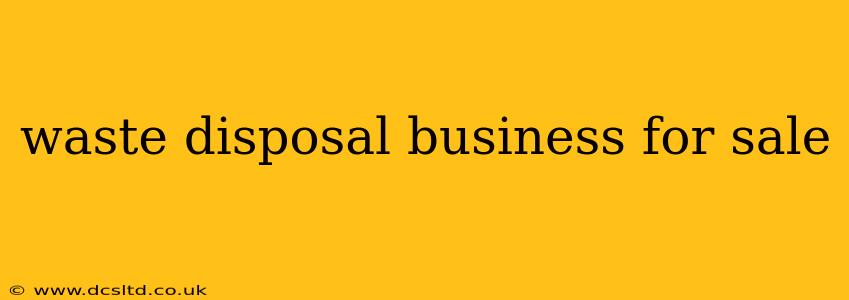The waste disposal industry is a resilient and essential sector, consistently in demand regardless of economic fluctuations. If you're considering purchasing a waste disposal business, this guide provides a comprehensive overview of what to expect, key considerations, and crucial questions to ask. Owning a waste disposal business can be lucrative, but it also requires significant investment, operational expertise, and a keen understanding of environmental regulations.
What Types of Waste Disposal Businesses are for Sale?
The market for waste disposal businesses encompasses a broad spectrum of operations, each with its own unique set of challenges and rewards. Some common types include:
- Residential Waste Collection: This involves collecting garbage and recyclables from homes and apartments. These businesses often require a large fleet of trucks and a robust logistics system.
- Commercial Waste Collection: Focusing on businesses and industrial sites, this segment often deals with larger volumes and more diverse waste streams, requiring specialized handling equipment and expertise.
- Hazardous Waste Disposal: This highly regulated niche handles toxic and dangerous materials, requiring specialized permits, training, and equipment. It offers higher profit margins but comes with significant liability.
- Recycling Centers: These businesses focus on sorting and processing recyclable materials, contributing to environmental sustainability and often benefiting from government incentives.
- Transfer Stations: Acting as intermediaries, transfer stations consolidate waste from various collection points before transporting it to landfills or processing facilities.
What are the Key Factors to Consider When Buying a Waste Disposal Business?
Before making an offer, carefully evaluate these critical factors:
- Financial Performance: Scrutinize the business's financial records, including revenue, expenses, profitability, and cash flow. Look for consistent growth and profitability trends.
- Customer Base: A strong customer base is crucial for a waste disposal business. Assess the size, stability, and contract terms with existing clients. Are contracts long-term? What is the customer retention rate?
- Equipment & Assets: Evaluate the condition and age of the company's vehicles, equipment, and facilities. Consider maintenance costs and potential replacements.
- Legal & Regulatory Compliance: Waste disposal businesses are heavily regulated. Ensure the business operates in full compliance with all applicable environmental laws and permits. Penalties for non-compliance can be severe.
- Employee Base: A skilled and experienced workforce is essential for efficient operations. Assess the quality of the employees and the management team.
- Competition: Analyze the competitive landscape to understand your market share and potential challenges.
- Growth Potential: Identify opportunities for expansion, such as new service offerings, geographic expansion, or technological upgrades.
What are the Common Costs Associated with Owning a Waste Disposal Business?
Operating a waste disposal business entails significant ongoing expenses:
- Vehicle Maintenance & Fuel: A substantial portion of operating costs will go towards maintaining your fleet and fuel consumption.
- Labor Costs: Wages, benefits, and worker's compensation for drivers, loaders, and administrative staff.
- Insurance: High liability insurance is essential due to the inherent risks associated with waste handling.
- Permits & Licenses: Maintaining compliance with environmental regulations requires ongoing investments in permits and licensing.
- Disposal Fees: Costs associated with disposing of waste at landfills or processing facilities.
- Equipment Repairs & Replacements: Regular maintenance and occasional replacements of vehicles and equipment can be costly.
How Much Does a Waste Disposal Business Typically Cost?
The price of a waste disposal business varies greatly depending on factors such as size, location, assets, and profitability. Smaller, local businesses may be available for a few hundred thousand dollars, while larger, established companies can command millions. A professional business valuation is highly recommended before making any purchase decisions.
What are the Benefits of Owning a Waste Disposal Business?
Despite the challenges, owning a waste disposal business offers several advantages:
- Essential Service: The industry provides an essential service, ensuring consistent demand.
- Potential for High Profit Margins: Efficient operations can lead to significant profits.
- Opportunities for Growth: Expansion into new markets or service offerings is often possible.
- Contribution to Environmental Sustainability: Implementing recycling and waste reduction programs can contribute positively to the environment.
What Due Diligence Should I Conduct Before Purchasing a Waste Disposal Business?
Thorough due diligence is critical. This includes:
- Financial Audits: Independent verification of financial statements.
- Legal Review: Examination of all permits, licenses, and contracts.
- Environmental Site Assessments: Assessment of potential environmental liabilities.
- Operational Review: Evaluation of operational efficiency and management practices.
This guide provides a foundational overview. Seeking advice from experienced business brokers and legal professionals specializing in the waste disposal industry is highly recommended before investing in this sector. Remember that success in this business requires a strong understanding of both business management and environmental regulations.
